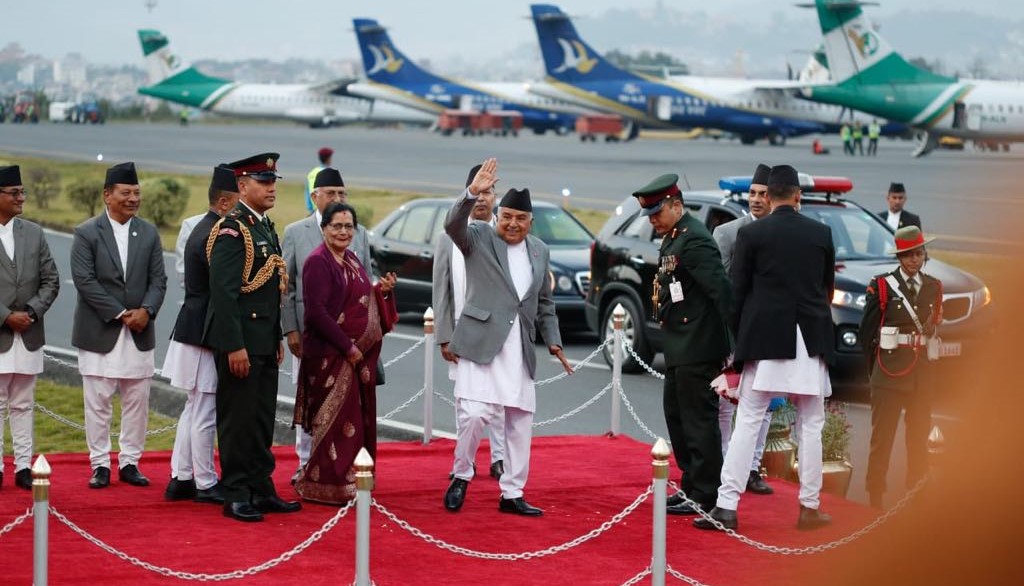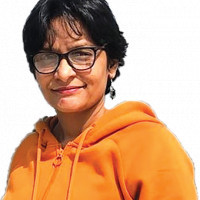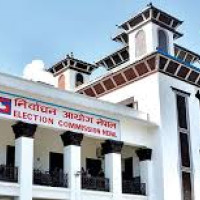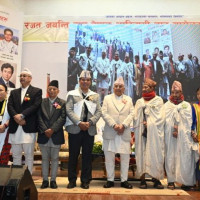- Monday, 9 February 2026
President departs for Azerbaijan to attend COP 29
Kathmandu, Nov. 11: President Ramchandra Paudel departed for Baku, Azerbaijan, on Sunday leading a delegation to participate in the 29th Conference of the Parties (COP) to the UN Framework Convention on Climate Change (UNFCCC).
He was seen off by Vice President Ram Sahay Prasad Yadav, Prime Minister KP Sharma Oli, Speaker Devraj Ghimire, Deputy Prime Minister Prakashman Singh, Home Minister Ramesh Lekhak, Foreign Minister Dr. Arzu Rana Deuba and others at the VVIP Lounge of the Tribhuvan International Airport.
The President is accompanied by his spouse, Sabita Paudel and will be joined by the Minister for Forests and Environment Ain Bahadur Shahi Thakuri and senior officials from the Government of Nepal.
The President is scheduled to return on November 15, 2024, a statement of the Ministry of Foreign Ministry said.
The 29th COP will formally begin on November 12 in Baku and conclude on November 22.
President Paudel will deliver a national statement alongside leaders from at least 50 other countries at the World Leaders Summit, according to a statement issued by the Office of the President on Sunday.
The formal opening of the Summit will be held in the Plenary Nizami, where heads of state and government (HoS/G), party delegations, special guests of the Azerbaijani President, and leaders of the UN and other international organisations will attend.
President Paudel is scheduled to deliver his statement on November 12, 2024, according to a press statement issued by the Ministry of Foreign Affairs on Saturday.
On November 13, he will be the Chief Guest at a high-level side event titled “Mountains in Peril: Loss and Damage in the Himalaya,” organised by the Government of Nepal.
The President will also hold bilateral meetings with various heads of state, heads of government, and other high dignitaries during the summit.
Before leaving for Baku, President Paudel designated Vice President Ram Sahay Prasad Yadav to carry out the responsibilities in his absence as per Article 67 (2) of the constitution.
Nepal to highlight loss and damage in mountain regions
According to Dr. Deepak Kumar Kharal, Secretary at the Ministry of Forests and Environment, the high-level session on November 13, led by President Paudel, will bring Nepal's climate agendas to the global stage. Similarly, a session on “Addressing Climate-Induced Loss and Damage in Mountain Regions” is planned to raise awareness about the unique vulnerabilities of mountainous areas.
Nepal is one of the countries most affected by climate change globally. Nepal is set to present data on the impacts of recent devastating weather events, such as the severe floods and landslides of September 28 and 29, 2024, which significantly impacted lives and property across the country.
The UNFCCC has permitted Nepal to host a high-level meeting on “Addressing Climate Loss and Damage in Mountainous Regions” during the conference. This session will bring together UN representatives, officials from mountainous countries, development partners and relevant stakeholders to discuss the unique climate challenges facing mountain regions, Dr. Kharal said.
President Paudel will also present findings from recent research titled “Rapid Urbanisation and Climate Change: Key Drivers of Dramatic Flood Impacts in Nepal.” Conducted following the extreme September rainfall, this study documents the severe flash floods, landslides and riverine flooding that affected Kathmandu and surrounding areas, showing that these impacts were exacerbated by climate change and rapid urbanization, said Manjeet Dhakal, climate analyst and advisor to the Minister for Forests and Environment.
The research, a collaborative effort by experts from Nepal, India, Sweden, Australia, the United States and the United Kingdom, assesses how human-induced climate change altered the likelihood and intensity of the extreme rainfall events that led to recent landslides and floods in Nepal, Dhakal, who is in Baku, said over the phone.
Dhakal said that these findings would be shared at a special event organised by President Paudel. Dr. Kharal, Secretary of the Ministry of Forests and Environment and representatives from the National Disaster Risk Reduction and Management Authority (NDRRMA) will also present the findings of the research during this event.
“The research underscores that the recent extreme rainfall was linked to climate change, which will support Nepal's advocacy on the global stage,” Dhakal said.
Nepal has prepared a national status paper based on issues raised in previous conferences, international forums, parliamentary committee guidance, and stakeholder consultations. Key topics emphasised in the paper include loss and damage, mountain ecosystems, and climate finance.
In 2020, Nepal submitted its second Nationally Determined Contributions (NDC), followed by its National Adaptation Plan (NAP) in 2022, which outlines the country’s emission reduction and adaptation goals.
All countries are expected to submit their second updated NDCs by March 2025, and to date, only the United Arab Emirates has submitted an updated NDC, according to Dhakal. As a party to various international climate agreements, Nepal has also implemented a national adaptation programme set to be completed by 2050.
Technical session
Following high-level meetings, technical sessions and conferences will take place, featuring dialogues, negotiations, and the presentation of 14 thematic papers.
Nepal faces multiple climate-related disasters annually, including extreme rainfall, floods, landslides, glacial lake outburst floods (GLOFs), droughts, and wildfires.
“Countries like Nepal must unite to raise the issue of loss and damage funds at the conference,” Dr. Kharal said, saying that Nepal is preparing to present a united agenda on this matter.
The issue of mountains and climate change will be addressed in a separate discussion with other mountainous countries, as it has never been a formal agenda item previously, Dr.
Kharal added. A team of technical experts from Nepal is already at the conference, actively working on these key issues.

















